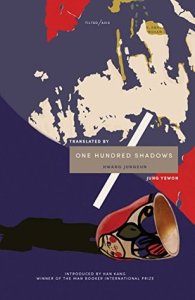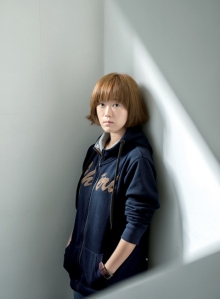 Ethereal, dream-like, accepting of their fate. South Korean working class literature.
Ethereal, dream-like, accepting of their fate. South Korean working class literature.
Two young people work in an electronics market and slowly develop a friendship.
We meet Eungyo as she is following her shadow, causing her to become separated from the group she is with. Mujae follows her and stops her. Shadows rise and seem to lure one to follow it, something that others try to prevent, for it feels death-like.
Although it is never explained the constant mention of human shadows and their various behaviours provoke the reader’s imagination to ascribe meaning. Ill health and approaching death cause it to rise, and perhaps thoughts, reaching the limit of what one is able to endure. One shouldn’t follow it.
Their bond is formed as the environment within which they work is threatened with demolition. There is a subtle interdependency between the market traders, repairing and selling electronics, so when people who have worked there for years suddenly disappear, it unsettles the tenants.
Rumours and false media reports hasten their demise. They hold onto rituals, sharing soup, drinking rice wine, telling stories.
Do you know what a slum is, Eungyo?
Something to do with being poor?
I looked it up in a dictionary.
What did it say?
An area in a city where poor people live. Mujae looked at me. They say the area around here is a slum.
Who?
The papers, and people.
Slum?
It’s a little odd, isn’t it?
It is odd.
Slum.
Slum.
We sat there repeating the word for a while, and then I said, I’ve heard the word, of course, but I’d never thought of this place as a slum.
This short novella witnesses the various encounters between these two, the stories they recount which often include shadows they’ve witnessed, the simple soups they consume, the songs they sing. Shadows, soup, songs, survival.
The novel was inspired by the effect on ordinary working class people affected by Korea’s eviction-centred redevelopment policies, where the government removed residents and vendors by intimidation and force. Redevelopment involved a complex web of often obscure relationships between corporations and government, wealthy landowners and hired thugs, low-income tenants and the police. The novella provides a gentle, poetic insight into those marginalised by those policies.
 Hwang Jungeun’s debut novel, translated by Jung Yewon was a critical and commercial success in South Korea with its mix of oblique fantasy, hard-edge social critique, and offbeat romance.
Hwang Jungeun’s debut novel, translated by Jung Yewon was a critical and commercial success in South Korea with its mix of oblique fantasy, hard-edge social critique, and offbeat romance.
“My home was described in the news as ‘a slum’. This was an outside view; I wrote my novel to show it from the inside.”
It won the prestigious Hankook Ilbo Literary Award and the Korean Booksellers’ Award. Mentioned by Han Kang, who won the 2016 Man Booker International Prize for The Vegetarian as South Korea’s rising literary star.
Click Here to Buy a Copy of One Hundred Shadows
Note: This novel was an ARC (Advance Reader Copy) kindly provided by the publisher, Tilted Axis as an e-book.

Naturally I’m interested. Thanks for the review. Off to our bookshop later!
LikeLiked by 1 person
It’s interesting to read around these novels which reference historical events that we are unlikely to have heard of, our media being so centred on itself and stories that concern the West. I like that rather than focus on the tragic, this author focuses on two lives that continue and semi-flourish, beneath and despite the dark shadow that threatens to oppress them.
LikeLike
Reblogged this on e a m harris and commented:
Korean literature is new to me. I’ve just bought this book and look forward to reading it. I don’t generally go for romance, but this sounds intriguing.
LikeLiked by 1 person
Thanks for sharing with your folowers E A M Harris, you might be intrested to read Han Kang, I’ve read two of her novellas and they are extremely powerful for the short read they require. This one is not exactly a romance novel, it’s more literary fiction, a friendship that develops, or a sign that life and love still go on, despite the significant setback that the demolition of their workplace i,poses on the workers and residents. A work of social realism. It’s interesting that both Han Kang and this author set their novels against the aggressive policies of a government, a history we know little about, though the humanitarian aspect is universal.
LikeLiked by 1 person
Excellent review Claire. This sounds like a wonderful read, enlightening and immersive. I very much enjoyed both of Han Kang’s books and I suspect I will be looking this one up too. Thanks.
LikeLiked by 1 person
I really enjoyed Panty, Tilted Axis’ first book, so I’m looking forward to this – it sounds like a nice mix of light and shade.
LikeLiked by 1 person
I read about Panty, sad to hear how it drove the author pretty much into exile, wasn’t sure if it was a book for me to actually read, thought I wish authors had more freedom of expression everywhere.
LikeLike
This sounds fascinating – I loved ‘The Vegetarian’ and am still haunted by ‘Human Acts.’ Thank you so much for the name of another translated Korean writer to look out for.
LikeLiked by 1 person
Yes,a recommendation and prediction from Han Kang is tempting isn’t it. I enjoyed the book and it provoked me to learn more about the events alluded to, although it is a simple story, but incredibly life affirming, albeit melancholy.
LikeLiked by 1 person
For anyone interested in some background on Korean history, with a slant toward women, you might check out “Korea, Are You at Peace? A Tale of Two Women Travelers in a Troubled Land.”
LikeLike
Pingback: It’s Monday and once again I didn’t post anything last week | Real Life Reading